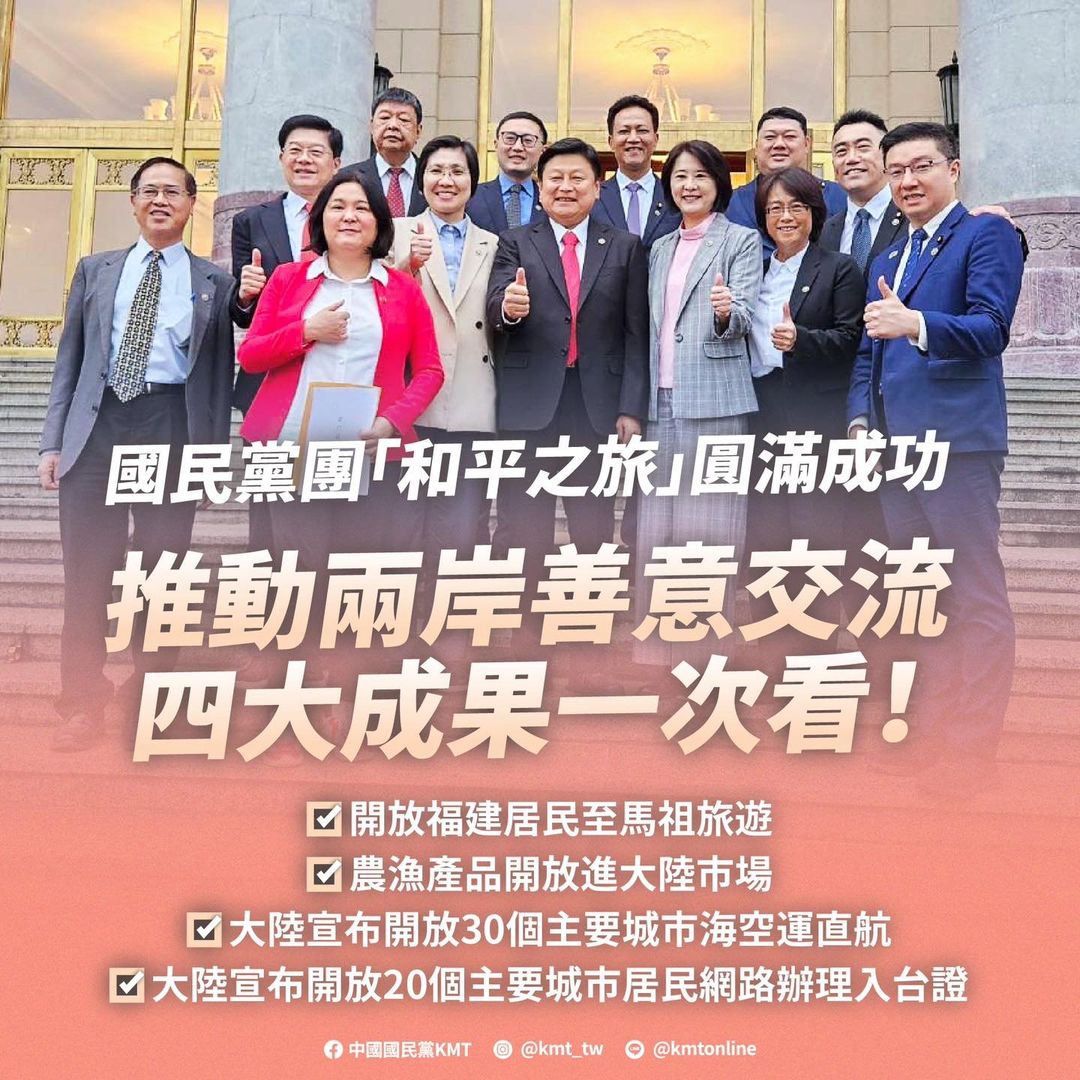by Brian Hioe
語言:
English
Photo Credit: Fu Kun-chi/Facebook
KMT LEGISLATIVE CAUCUS convener Fu Kun-chi returned yesterday from a trip to China. While the trip has mostly been described in terms of that Fu led the delegation, sixteen other KMT legislators traveled together with Fu. Consequently, close to 1/3rd of the KMT legislative caucus, which consists of 52 individuals, traveled to China with Fu.
News broke earlier this month that Fu intended to travel to China with a KMT delegation, in the wake of the meeting between former president Ma Ying-jeou and Chinese president Xi Jinping. Initial reports, in fact, suggested that the planned trip to China would involve a number of high-ranking KMT politicians including KMT chair Eric Chu, former deputy chair and former Taipei mayor Hau Lung-bin, and former majority speaker Wang Jinpyng.
Fu’s trip was delayed by one day, however, after an earthquake struck his home constituency of Hualien last week. Fu likely wished to avoid the perception that he had abandoned Hualien in a time of need, though the short duration of the delay led to criticisms from the DPP that Fu would prefer to be in China rather than in Hualien.
 Photo credit: Fu Kun-chi/Facebook
Photo credit: Fu Kun-chi/Facebook
Eventually, the legislators that did accompany Fu were Chang Chih-lun, Cheng Cheng-chien, Chen Hsueh-sheng, Chen Yu-chen, Chiu Chen-chun, Huang Jen, Hsu Hsin-ying, Liao Hsien-hsiang, Lin Chien-chi, Lin Pei-hsiang, Lo Ming-tsai, Sasuyu Ruljuwan, Sra Kacaw, Wang Hung-wei, Weng Hsiao-ling, and Yu Hao. Lo Ming-tsai and Wang Hung-wei were late additions to the trip, joining because proceedings in the legislature finished early. During the trip, Fu met with Chinese government officials such as Taiwan Affairs Office director Song Tao. Some of these lawmakers, such as Sasuyu Ruljuwan, have traveled to China more than once in the last month.
Fu has framed the trip as intended as an “ice-breaker” with Chinese counterparts. To this extent, Fu has touted that the trip has resulted in dividends for Taiwan. This includes China lifting its ban on Taiwanese pomelos, as well as some agriculture and fisheries products. Indeed, Fu claimed that part of the purpose of the trip was to promote Taiwanese agriculture and fisheries products in China. But the bans on pomelos and related products would be one of the means adopted by China of economically pressuring Taiwan in past years, in intimating economic retaliation if Taiwan elects DPP policymakers, and attempting to coerce farmers–an influential interest group in Taiwan–into voting for the KMT.
Likewise, since Fu’s trip, the Chinese government announced that it would be allowing group tourism to the outlying island of Matsu to resume for residents of Fujian. The Chinese government has made further relaxing the current ban on group tours contingent on reopening ferry travel between Taipei, Taichung, and China’s Pingtan County, as well as direct flight routes with a number of Chinese cities. The partial lifting of China’s current ban on group tours to Taiwan has been criticized as an attempt to frame the DPP as unwilling to relent on the issue of tourism, while framing the partial lifting of the ban as a gesture of goodwill. By contrast, the DPP has criticized China for being unwilling to allow for free travel to Taiwan.
 Image released by the KMT touting the trip. Photo credit: KMT/Facebook
Image released by the KMT touting the trip. Photo credit: KMT/Facebook
According to Fu, the Chinese government has also agreed to allow for the resumption of direct flight routes between Taiwan and 30 Chinese cities. Fu also claims that residents of twenty large Chinese cities including Beijing, Shanghai, Chongqing, and Tianjin will be allowed to apply for travel to Taiwan.
Fu’s trip, then, would be to reemphasize the KMT’s traditional claim to be the only political party in Taiwan able to communicate with the CCP. In this way, the KMT frames itself as the only political party in Taiwan able to maintain stable cross-strait relations, while depicting the DPP as dangerously pro-independence. The Chinese government has followed suit with these new measures, intended to prop up this claim by the KMT, which it has historically used to justify why it should be the political party in Taiwan allowed to hold office.
In the meantime, however, the DPP has criticized visits by Fu and other KMT legislators to China as lacking in transparency, in that the public has little way to know what was discussed between KMT policymakers and Chinese government officials, noting that there have been 24 known official trips by KMT legislators to China in past years. DPP lawmakers Lai Jui-lung and Puma Shen have proposed legislation to require lawmakers to report on trips to China and meetings with Chinese government officials in the future.

